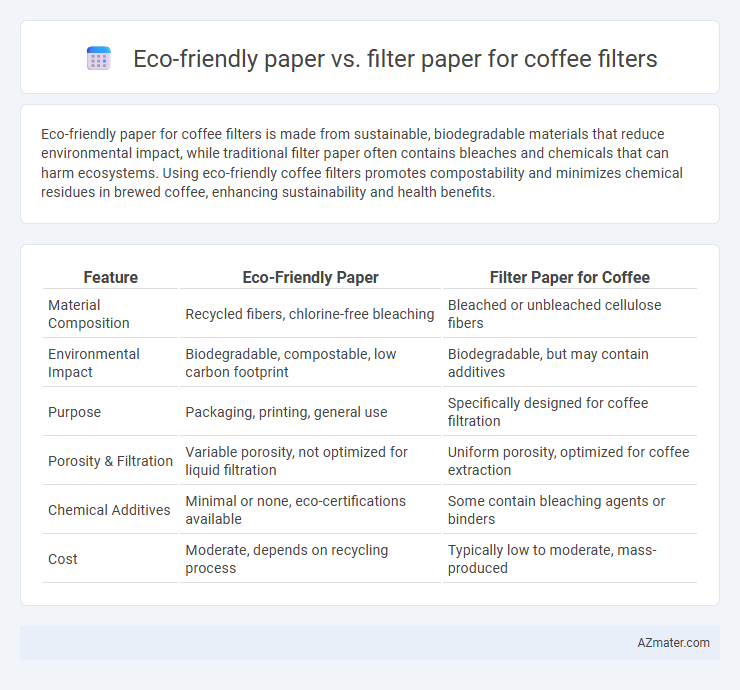Eco-friendly paper for coffee filters is made from sustainable, biodegradable materials that reduce environmental impact, while traditional filter paper often contains bleaches and chemicals that can harm ecosystems. Using eco-friendly coffee filters promotes compostability and minimizes chemical residues in brewed coffee, enhancing sustainability and health benefits.
Table of Comparison
| Feature | Eco-Friendly Paper | Filter Paper for Coffee |
|---|---|---|
| Material Composition | Recycled fibers, chlorine-free bleaching | Bleached or unbleached cellulose fibers |
| Environmental Impact | Biodegradable, compostable, low carbon footprint | Biodegradable, but may contain additives |
| Purpose | Packaging, printing, general use | Specifically designed for coffee filtration |
| Porosity & Filtration | Variable porosity, not optimized for liquid filtration | Uniform porosity, optimized for coffee extraction |
| Chemical Additives | Minimal or none, eco-certifications available | Some contain bleaching agents or binders |
| Cost | Moderate, depends on recycling process | Typically low to moderate, mass-produced |
Understanding Eco-friendly Coffee Filter Papers
Eco-friendly coffee filter papers are designed to reduce environmental impact by using biodegradable, unbleached materials such as organic hemp, cotton, or recycled fibers, ensuring minimal chemical residue in brewed coffee. These filters often avoid chlorine bleaching, which helps preserve water quality and reduces harmful byproducts compared to traditional filter paper that may contain chemical additives. Choosing eco-friendly coffee filter papers supports sustainable coffee brewing practices while maintaining effective filtration and a clean taste profile.
What Are Traditional Filter Papers?
Traditional filter papers for coffee are typically made from bleached wood pulp or cotton fibers, designed to efficiently trap coffee grounds while allowing water to pass through. These papers often undergo chemical treatments such as bleaching agents like chlorine or oxygen-based compounds, which can impact environmental sustainability. Eco-friendly alternatives use unbleached, biodegradable fibers or recycled materials that reduce chemical usage and waste, promoting a greener coffee brewing process.
Environmental Impact Comparison
Eco-friendly paper coffee filters, typically made from unbleached, biodegradable materials, significantly reduce environmental impact by minimizing chemical use and promoting faster decomposition compared to traditional filter papers often treated with chlorine or synthetic additives. Filter papers contribute to deforestation and chemical pollution during manufacturing, whereas eco-friendly alternatives support sustainable forestry and lower carbon footprints through responsible sourcing and production processes. Choosing eco-friendly filters helps decrease landfill waste and water contamination, aligning with environmentally conscious coffee brewing practices.
Material Composition and Biodegradability
Eco-friendly coffee filters are typically made from unbleached, natural fibers such as bamboo or recycled paper, enhancing their biodegradability and minimizing environmental impact. Traditional filter paper often contains bleached wood pulp and may include chemical additives that slow decomposition when discarded. Choosing eco-friendly materials ensures the filters break down more quickly in composting conditions, aligning with sustainable coffee brewing practices.
Coffee Flavor Differences
Eco-friendly paper coffee filters, often made from unbleached or recycled fibers, tend to preserve more of the coffee's natural oils and subtle flavors, resulting in a richer and fuller taste profile. Filter paper, especially bleached varieties, typically produce a cleaner cup by removing most of the oils and sediment, which highlights brighter and more acidic notes in the coffee flavor. Choosing between eco-friendly and conventional filter papers can significantly influence the balance between clarity and body in the brewed coffee's flavor.
Filtration Effectiveness
Eco-friendly paper coffee filters often utilize natural fibers that provide effective filtration while minimizing environmental impact, capturing fine coffee grounds and oils to produce a clean cup. Filter paper specifically designed for coffee offers superior pore size consistency, ensuring optimal extraction and clarity by retaining sediment and unwanted particles. The filtration effectiveness of each depends on fiber density and pore size, with eco-friendly options balancing sustainability and performance, whereas traditional filter paper prioritizes precise filtration quality.
Cost Analysis: Eco-friendly vs. Filter Paper
Eco-friendly coffee filters typically cost more upfront than traditional filter paper due to sustainable materials and manufacturing processes, averaging around $0.10 to $0.20 per filter compared to $0.05 to $0.10 for standard paper filters. Over time, the reusable nature of some eco-friendly filters, like cloth or metal alternatives, can reduce overall expenses by eliminating frequent repurchase costs. Factoring in environmental impact costs and waste disposal savings further enhances the long-term cost-effectiveness of eco-friendly coffee filters.
Usage and Disposal Convenience
Eco-friendly paper coffee filters are made from biodegradable materials, ensuring quick decomposition and minimal environmental impact after use, making disposal highly convenient. Filter paper for coffee often contains bleaching agents and synthetic fibers, which may slow down degradation and require specific waste processing methods, complicating disposal. Usage-wise, eco-friendly filters provide comparable filtration performance while appealing to environmentally conscious consumers seeking sustainable brewing options.
Consumer Preferences and Trends
Consumers increasingly prefer eco-friendly paper coffee filters due to their biodegradable and compostable properties, aligning with growing environmental awareness. Filter paper remains popular for its consistent filtration quality and ease of use, but trends show a shifting demand towards sustainable materials that reduce waste. Market data indicates a rising consumer inclination towards products labeled as organic, chlorine-free, or made from recycled fibers in coffee filter selections.
Which Coffee Filter Is Right For You?
Eco-friendly coffee filters, made from biodegradable or recycled materials, offer a sustainable choice that reduces environmental impact compared to traditional filter paper, which is typically bleached and single-use. Choosing the right coffee filter depends on factors like brewing method, flavor preference, and environmental concerns--eco-friendly filters may impart a cleaner taste and align with green values, while conventional filter paper ensures consistent filtration and wide availability. Assessing your priorities in taste, convenience, and ecological footprint helps determine whether eco-friendly or standard paper filters suit your coffee routine best.

Infographic: Eco-friendly paper vs Filter paper for Coffee filter
 azmater.com
azmater.com